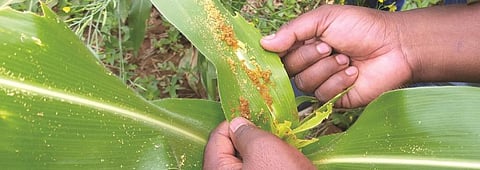

The spread of the Fall Armyworm (Spodoptera frugiperda) or FAW, the invasive pest from the Americas, to Africa, and finally to South and Southeast Asia, has created a rush among big agriculture companies to promote their chemical pesticide products.
With the arrival of the worm in Thailand in December 2018, Monsanto, the American agrochemical company, has already held a meeting with Thai authorities earlier this year.
Now, Corteva Agriscience, the agricultural division of DowDuPont, another American chemical company, is also trying to push its products.
At a meeting held by Corteva Agriscience in Bangkok on May 22-23, 2019, as part of the FAW educational programme, the plant and protection research and development officer of Thailand’s agriculture ministry, senior entomologist, SaruteSudhi-Aromna put forth a list of nine chemical sprays that the Thai authorities have recommended for use against FAW. Three among them are manufactured by Corteva Agriscience.
“We did a study on the efficacy of insecticides on FAW and came up with the recommendation of these nine sprays on crops infested with FAW,” he told Down to Earth.
Currently, around 50 provinces of Thailand’s maize-growing areas have been infested with FAW, with severe infestation being reported from western Thailand. Official estimates suggest there could be a yield loss of 25-40 per cent and a monetary loss of $130-260 million.
In India too, the Ministry of Agriculture and Farmer Welfare recommended the compulsory seed treatment with Cyantraniliprole and Thiamethoxam of maize seeds on May 6. However, this recommendation was made without consulting with the ministry's own scientists.
OM, Fall Army Warm by Rajat Ghai on Scribd
The problem with FAW is that it has the ability to become resistant to pesticides as well as Bt species. There are strains of FAW which have become resistant to insecticides.
FAW has been reported as being resistant to Pyrethroids/DDT, Organochlorines, Ryanodine receptor-based insecticides, nAChR agonists,Voltage-gated chloride channel modulator, Chitin synthesis inhibitor, and Cry toxins. Resistance is predominant in the United States, Brazil, Mexico, Argentina and Puerto Rico, according to data from the South Asia Biotechnology Centre (SABC) — a Delhi-based non-profit working on agriculture and science.
“Now that the fire-fighting time is over as far as FAW is concerned, we now need to do hard-core research and find out a proper long-term solution to it which follows the Integrated Pest Management approach encouraged by the Food and Agriculture Organization,” Govind Gujar, a research scientist with SABC said.
“The pesticide should only be applied if it is not damaging to the environment, and as a last resort. We should have all options available to use in fighting with FAW and that includes environmentally safe pesticides, along with biological control,” said BM Prasanna, director, Consortium of International Agricultural Research Centers’ Research Program MAIZE.
He added that keeping the economic cost in mind was very important. “The farmer or the government officials or agro-dealers should know the economic aspect of the pesticide. If the economic cost of applying the pesticide is more than the value of the crop, then it shouldn't be done.”